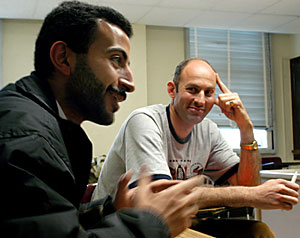 |
|
MELISSA HALTERMAN/Arizona Daily Wildcat
|
Ali Mohammed and Hamby Singary are two Iraqi Fulbright scholars studying English as a second language at the UA. The two shared their experiences as foreign students on Friday at the CESL building.
|
|
|
By Walter E. Staton
Arizona Daily Wildcat
Monday, March 8, 2004
Print this
6 Fulbright Scholars from Iraq learning English, politics in U.S.
It used to be only a dream for Iraqi scholars to study abroad in the United States.
But now, 10 months after the end of the war that toppled Saddam Hussein's regime, six Iraqi Fulbright Scholars have arrived to study at the UA.
There are 25 Iraqi Fulbright Scholars in the United States this year.
Ali Mohammed and Hamdy Singary are two of the six Iraqi students learning English at UA's Center for English as a Second Language. They will be here until August.
Both students said they have come to learn more about America's political system.
Singary, who spoke with the help of an interpreter, has worked in Iraq as a lawyer, a security investigator and a security adviser to the secretary of the interior in Baghdad. He said he is interested in applying federalism back home.
Singary is from Arbil in northern Iraq's Kurdish region. He said federalism is a system he believes will unify Iraq. He said the Kurdish people, who have remained relatively autonomous since the first Gulf War, want to be a part of Iraq now that the old regime is gone.
"(The Kurds) have asked for unity," Singary said, "but according to a federalist system."
Mohammed, a recent graduate of an Iraqi law school, said he wants to attend law school here and is aiming for the top - Yale or Harvard.
After returning to Iraq, he hopes to work in the government and teach students about the U.S. system, he said.
"It is necessary for students to improve their knowledge," he said.
Both Mohammed and Singary spoke openly about the war in Iraq.
Mohammed said he lives on a highway that leads into his town and that he saw the American troops come in. He said there was a cannon in front of his house that was used by Hussein's troops. But after the Americans came through, the cannon was blown up and the windows on many of the homes around it were shattered.
He said the majority of the fighting was during the night at the edge of the cities between the Republican Guard and the Americans.
Singary said he is happy with the result of this war: the ousting of Hussein and his regime. But he said outside groups have spoiled the happiness by creating instability among Iraq's ethnic and religious groups.
He said the conflict between the Sunni and Shiite Muslims was introduced by Hussein to divide the people.
"They can live together," he said. "Iraqi people will rise above that."
Singary said he lost an uncle, a cousin and many friends to a suicide attack on Feb. 1. His uncle was the vice prime minister of Kurdistan.
"All of them have spent their lives sacrificing and waiting for freedom," he said.
The students' time in America hasn't been entirely serious. They said they are still adjusting to the culture, and are often caught in funny situations.
Mohammed said he feels like British comedian, Mr. Bean.
"I watch others to see what they do, then follow," he said.
Singary said sometimes he doesn't even know what he is getting to eat. He laughed, saying he just used to point to an item at McDonald's to order it.
"The food in America," he said, "is only cheese, cheese, cheese."
And lots of sugar, added Mohammed.
"Everything has sugar," he said, mentioning that even beans have sugar added.
Mohammed, after indulging himself with McDonald's, said he hates it. He has turned to Panda Express, he said, because it has something he is more familiar with - rice.
Although they may not miss American food when they leave, Singary said he will miss the services provided for the disabled.
He said he hopes that one day what the disadvantaged get here will be available to those in Iraq.
Mohammed said the one thing he noticed about America was the strength and power of the law.
"I feel the law is strong," he said.
He said the main distinction between America and Iraq are the customs.
"Here, it is completely different," he said.
One difference Mohammed pointed out is that sitting with your legs crossed is an insult in Iraq.
"You can't show the bottom of your shoe to others," he said.
Mohammed said many liquor stores have been shut down in his hometown of Hillah, and beer has to be purchased through the black market.
Mohammed and Singary said they are enjoying their time in America and are eager to learn as much as they can about a system of government they hope will create stability and unity in their country.
